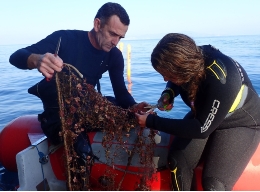Stop ghost fishing: more than 100 extraction operations of lost fishing gears in the Catalan coasts
The experts Bernat Hereu and Júlia Ortega, members of the Faculty of Biology and the Biodiversity Research Institute (UB-IRBio).
The Catalan coasts have undergone a total of 102 extraction operations of lost fishing gears in the seafloors since 2009, when the first removal of lost gears took place in the Montgrí, Illes Medes and Baix Ter Natural Park, under the scientific assessment by the experts of the Faculty of Biology and the Biodiversity Research Institute (IRBio) of the University of Barcelona. 75% of the extractions have taken place since the first protocol in Catalonia was published, in 2017 —driven by the University of Barcelona and the Directorate-General of Maritime Affairs and Sustainable Fishing of the Catalan Government (DGPMPS)— to remove the nets and sports and artisanal fishing gears located in the seafloors.
These are some conclusions of the report on the project Stop Ghost Fishing, presented on March 21, in the Museum of the Mediterranean (Torroella de Montgrí, Girona), and led by the experts Bernat Hereu and Júlia Ortega, from the Department of Evolutionary Biology, Ecology and Environmental Sciences of the UB and IBRio, with support from the DGPMPS. This science project has been decisive to value the impact of the lost fishing gears on the coastal marine ecosystems in Catalonia, as well as the dimension and typology of the lost devices in the seafloors.
Ghost fishing: a trap for marine lives
Every year, the Mediterranean Sea receives 3,000 tons of waste, and about 10% of it are lost or abandoned fishing gears in the seafloors. “The fishing gears stuck in the seafloors can capture organisms during years —the ghost fishing phenomenon— and cause an environmental impact, added to the negative effects of pollution, climate change, fishing, invasive species and the human access on marine biodiversity”, notes lecturer Bernat Hereu, scientific coordinator of the project and member of the research group MedRecover. Apart from threatening the marine life, the abandoned devices are a potential risk to the boats, the marine transit and the users of water activities.
The new report highlights the impact of ghost fishing on marine species with a high ecologic and commercial interest, such as lobsters, groupers, the dentex, the scorpionfish, cuttlefish, red coral and the red and white gorgonian. The scientists identified 88 affected species. They found 55 species to be trapped (ghost fishing) and 35 were affected by the erosion of the benthos. Fifty species have been found to use the gears as a substrate to grow.
Most of the removed lost gears were found in rocky substrates with coral (60%) and about 50% of recovered arts have been probably gillnets because the depth of these studies is less then 30 meters. The fact that most of the warnings about the presence of abandoned gear come from the sector of diving would explain part of the obtained results in these campaigns to protect the marine environment (for instance, areas where they found the depth, the habitats, etc.).
The adverse meteorology and bad practices linked to illegal fishing are the main causes for the loss of fishing gears in the marine environment. In this context, the current Protocol for the removal of lost fishing gears in the Mediterranean, written within the framework of this project, and the prevention tasks developed by the fishing inspection of the Directorate-General, are determining for reducing this problem and turn fishing into a more sustainable activity.
Scientists, managers, fishermen and citizens
The Project Stop Ghost Fishing, launched in 2015 by UB-IRBio experts to preserve the ecological values of the seafloors, included the collaboration of scientists, fishermen and representatives and the Administration (rangers, Catalan police forces, professional divers) to reduce the impact of the lost fishing gears in the seafloors.
Thanks to the scientific monitoring, the DGPMPS analyses the accumulated information and experience on the problem of ghost fishing in the Catalan coasts. As a result, the protocol to remove nets and fishing gears was updated, and a first evaluation of the impact of abandoned devices in the Catalan coasts has been written. This update on the protocol will encourage the involved actors to tackle this problem which is affecting the marine ecosystems, the fishermen and society.
“Projects like Stop Ghost Fishing show the importance of a multidisciplinary coordination from several sectors. This project was launched by the University of Barcelona with the support from the autonomous fishing administration, but it needs the collaboration of citizens —specially people who enjoy the sea such as scuba divers— and the fishing sector”, conclude the experts Bernat Hereu and Júlia Ortega.
UBTv video
